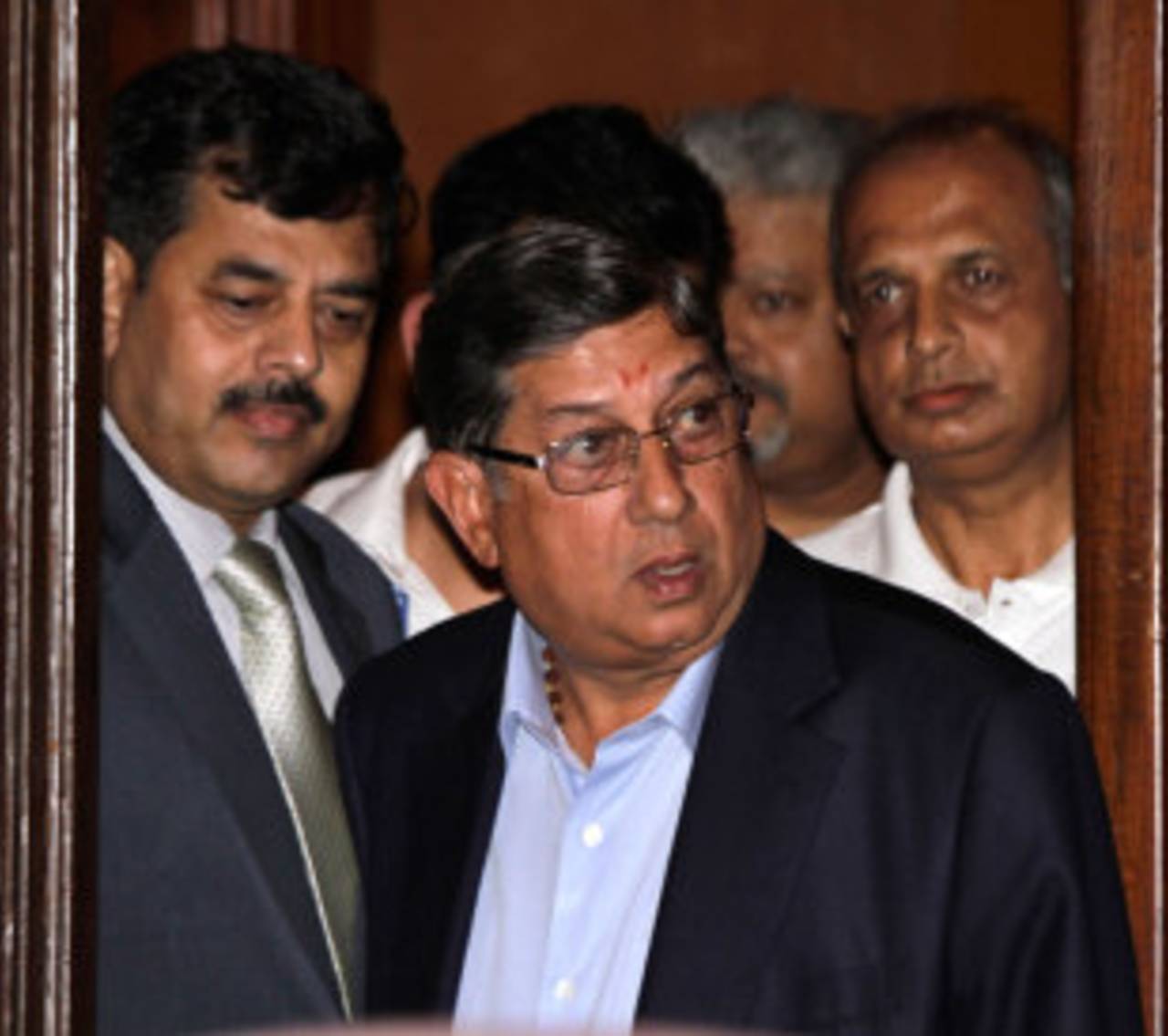Srinivasan's presidency secure till AGM
N Srinivasan looks likely to remain as BCCI president till the AGM in September 2013
Amol Karhadkar
May 26, 2013, 6:43 PM

N Srinivasan is likely to remain in his post as BCCI president, at least till the AGM in September • Associated Press
After 48 hours of intense speculation, off-record briefings by his board colleagues and what he called a "trial by media", N Srinivasan still stands as the BCCI president, and is likely to complete his minimum term of two years. His survival in a scandal that claimed his son-in-law is down to a combination of BCCI politics, and the compulsions of Indian party politics.
It is evident from his speech and body language over the past two days that Srinivasan has the numbers on his side, though the "unity" he spoke of at Sunday's press conference in Kolkata may be an exaggeration. This underlines the fact that, unless he gets directly implicated in any criminal activity, or if there is worse to emerge from the current police investigations that have tarnished the BCCI, Srinivasan will remain at the helm until the annual general meeting (AGM) in the last week of September.
"When the president doesn't step down voluntarily, it means that he is sure that he will have no problem in dealing with the numbers game if the need arises," said a BCCI member. "Even those who have been voicing dissent to the media without willing to come on record know that they don't have the requisite numbers to publicly open a front against the president. And in the wake of all this, with just four months remaining for the AGM, no sane member would push for moving a resolution against the president right now."
That's not to say there's no opposition. There are a handful of BCCI members who are unhappy with Srinivasan's defiance, but they lack unity. Over the last decade in BCCI politics, four or five major members have dominated the opinion of the rest of the voting members - 31 in all, including the incumbent president. And since none of the major officials, including those who aspire to head the BCCI in future, are in a hurry to overthrow the current regime, status quo is set to prevail till the AGM.
The political heavyweights in this play include Arun Jaitley, leader of the opposition in the upper house of Parliament, president of the Delhi and District Cricket Association (DDCA) and the man tipped to replace Srinivasan as the next BCCI president. Rajiv Shukla, the IPL chairman, is a prominent member of the ruling Congress party, and junior minister for parliamentary affairs. Sharad Pawar is not part of the BCCI, but is the most influential person outside it, and is also a minister of the federal government. All three would have at least one eye on country's general elections, scheduled to be held in May 2014. No one would like to lose face in a high-profile, if less significant, election before that.
The "opposition" had already shown its strength once, in 2011, when Jaitley combined with Shukla and Anurag Thakur, a rising politician from the BJP, to force Srinivasan into settling for a compromise as the BCCI secretary. Srinivasan, who was the secretary and president-elect before the 2011 AGM, is believed to have promised the secretary's post to Odisha Cricket Association chief Ranjib Biswal. However, on the eve of the AGM, the opposition swung into action and eventually Srinivasan had to settle for Sanjay Jagdale, one of the most respected cricket administrators, as the secretary.
The BCCI, however, retains a capacity to present itself as a cohesive unit when hit by a crisis. Just like in 2013, the business end of the 2010 IPL edition had been marred by allegations of financial impropriety by then IPL chairman Lalit Modi. When the federal government initiated a probe against all the transactions of the BCCI and IPL franchises, all the units of BCCI presented itself as a combined force. The fact that Modi was axed from all his positions made it easier to suppress any voice of dissent then.
Amol Karhadkar is a correspondent at ESPNcricinfo